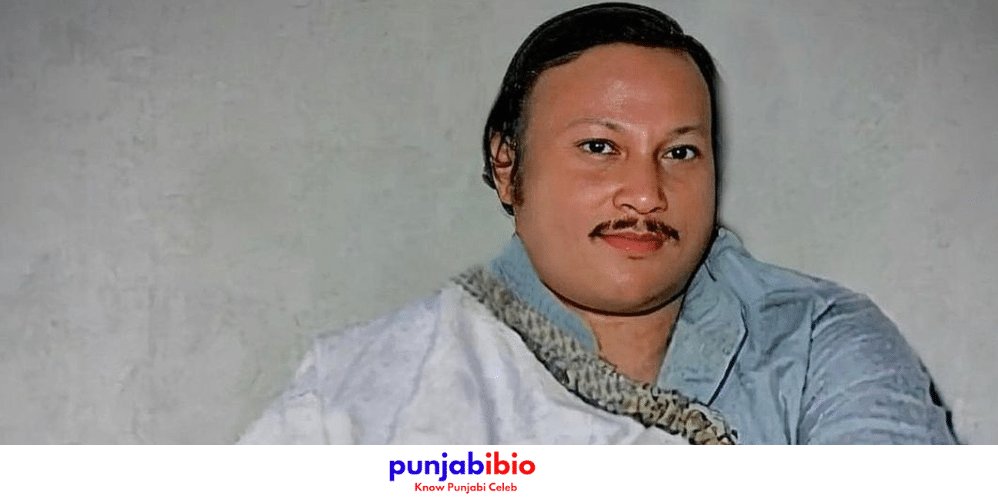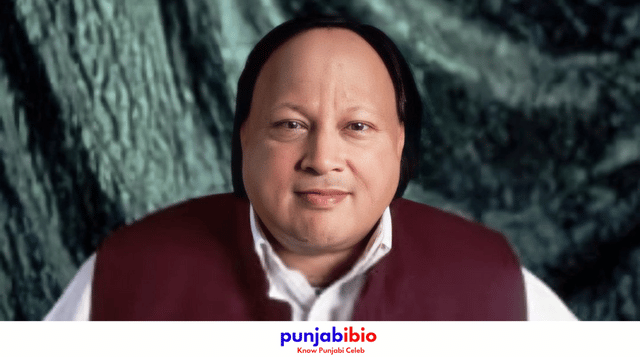Nusrat Fateh Ali Khan Biography
Nusrat Fateh Ali Khan PP was a Pakistani vocalist, lyricist, and music chief. He was fundamentally an artist of qawwali — a type of Sufi reflection music. Some of the time called the “Shahenshah-e-Qawwali” (the Lord of Rulers of Qawwali), he is viewed as by The New York Times to be the best qawwali artist of his generation. He was portrayed as the fourth most prominent vocalist ever by LA Week after week in 2016. He was known for his vocal capacities and could perform at an elevated degree of power for a few hours. Khan is broadly attributed with acquainting qawwali music with global audiences.
Brought into the world in Lyallpur (Faisalabad), Khan had his most memorable public presentation at 15 years old, at his dad’s chelum. He turned into the top of the family qawwali party in 1971, and brought his special style of sargam, khayal, and cadence to his family’s legacy.
Information
| Name | Nusrat Fateh Ali Khan |
| Nick Name | Nusrat Fateh |
| Profession | Singer, Television star, Model, Dancer and social media star |
| Famous for | Punjabi Song |
Personal Info
| Date of Birth | 13 October 1948 |
| Death of Birth | 16 August 1997 |
| Birth place | Lyallpur, Punjab, Pakistan |
| Death Place | London, England |
| Nationality | Pakistani |
| Religion | Punjabi Muslim |
| Zodiac sign | Libra |
| Food Habits | Non-Vegetarian |
| School | Not Known |
| College/ University | Not Known |
| Educational qualification | Graduated |
Physical stats and more
| Height | 5′ 9″cm |
| Weight (approx.) | 82kgs. |
| Body measurement (approx.) | 48-36-16 |
| Hair color | Half Bold-Black |
| Eye color | Black |
Affairs and more
| Marital Status | Married |
| Wife | Naheed Nusrat (m. 1979–1997) |
Family and Siblings
| Father | Fateh Ali Khan |
| Mother | Not Known |
| Sister | Not Known |
| Brother | Farrukh Fateh Ali Khan |
Favourite Things
| Favourite Food | Seekh Kabab, Biriyani, Butter Chicken |
| Favourite Actor | Amberdeep Singh |
| Favourite Actress | Aditi Sharma |
| Favourite color | Red |
| Favourite Film | Choti Si Umar |
| Favourite Sports Person | PV Sindhu |
| Favourite Singer | Alam Lohar, Noor Jehan |
| Favourite Attires | Formal suit, Jeans, T- Shirt |
| Favourite Destination | Goa |
Hobbies and Money Factor
| Hobbies | Writing & Travelling |
| Net Worth | 2 Million INR |
Social Media ID
| Facebook ID | Click to follow |
| Instagram ID | Click to follow |
| Twitter ID | Click to follow |
Facts About Nusrat Fateh Ali Khan
- He was endorsed by Oriental Star Organizations, Birmingham, Britain, in the mid 1980s.
- Khan proceeded to deliver film scores and collections in Europe, India, Japan, Pakistan, and the U.S. He participated in coordinated efforts and trials with Western specialists, turning into a notable world music craftsman.
- He visited widely, acting in north of 40 countries.
- As well as promoting qawwali music, he likewise significantly affected contemporary South Asian famous music, including Pakistani pop, Indian pop, and Bollywood music.
- Khan was naturally introduced to a Punjabi Muslim family in Lyallpur (current Faisalabad), Punjab, Pakistan, in 1948.
- His family starts from Basti Sheik Darvesh, who got comfortable Jalandhar, Punjab in present-day India. His precursors learned music and singing there and took on it as a profession.
- He was the fifth kid and first child of Fateh Ali Khan, a musicologist, singer, instrumentalist, and qawwal.
- Khan’s family, which included four more seasoned sisters and a more youthful sibling, Farrukh Fateh Ali Khan, experienced childhood in focal Faisalabad.
- The practice of qawwali in the family had gone down through progressive ages for very nearly 600 years.
- At first, his dad didn’t believe that Khan should follow the family’s work.
Also Read: Deep Jandu
- He had his heart set on Nusrat picking a considerably more decent profession way and turning into a specialist or designer since he felt qawwali craftsmen had low economic wellbeing. In any case, Khan showed such a fitness for and interest in qawwali, that his dad at last relented.
- In 1971, after the demise of his uncle Mubarak Ali Khan, Khan turned into the authority head of the family qawwali party and the party became known as Nusrat Fateh Ali Khan, Mujahid Mubarak Ali Khan and Party.
- Khan’s most memorable public presentation as the head of the qawwali party was at a studio recording broadcast as a feature of a yearly live concert coordinated by Radio Pakistan, known as Jashn-e-Baharan.
- Khan sang fundamentally in Urdu and Punjabi and sporadically in Persian, Braj Bhasha, and Hindi.
- His most memorable significant hit in Pakistan was the melody Haq Ali, which was acted in a customary style and with conventional instrumentation. The melody included limited utilization of Khan’s sargam improvisations.
- Khan, all through his vocation, had extraordinary comprehension with numerous south Asian vocalists like Alam Lohar, Noor Jehan, A. R. Rahman, Asha Bhosle, Javed Akhtar, and Lata Mangeshkar.
- In the 1992 to 1993 scholastic year, Khan was a Meeting Craftsman in the Ethnomusicology division at the College of Washington, Seattle, Washington, Joined States.
- Further to this in 1990, the BBC committed a whole program on Organization East to this joint effort, and Enormous World Bistro accordingly welcomed Khan, Andrew Kristy and musician Nigel Kennedy to perform Allah Hoo live on the show. A live UK visit containing these new combination tracks was made in 1990.
- Khan’s exploratory work for Genuine World, which highlighted his coordinated efforts with the Canadian guitarist Michael Stream, prodded on a few further joint efforts with various other Western writers and rock performers.
- One of the most imperative of these joint efforts came in 1995, when Khan assembled with Pearl Jam’s lead vocalist Eddie Vedder on two tunes for the soundtrack to Doomed soul.
- Khan additionally gave vocals to The Request Cycle which was assembled by Jonathan Elias, yet kicked the bucket before the tracks could be finished.
- Alanis Morissette was acquired to sing with his incomplete vocals. In 2002, Gabriel remembered Khan’s vocals for the track “Motion toward Commotion” on his collection Up.
- Khan’s collection Inebriated Soul was named for a Grammy Grant for Best Customary People Collection in 1997.
- That very year, his collection Night Melody was likewise designated for a Grammy Grant for Best World Music Album.
- Khan contributed the tune “Masters of Harmony” to the 1997 collection Vande Mataram, created by A. R. Rahman, and delivered to praise the 50th commemoration of India’s freedom.
- As a post mortem recognition, Rahman later delivered a collection named Masters of Harmony which included “Allah Hoo” by Khan. Rahman’s 2007 melody “Tere Bina” for the film Master was likewise made as a recognition for Khan.
- Khan was the primary entertainer at Imran Khan’s foundation offer show at the InterContinental London Park Path Lodging on December 3, 1992 to raise assets for Shaukat Khanum Commemoration Disease Medical clinic and Exploration Center, a malignant growth clinic worked in Imran’s moms name which gives free services.
More Read: Nusrat Fateh Ali Khan
- Different VIPs were additionally in the crowd including Peter Gabriel, Elizabeth Hurley, Mick Jagger, and Amitabh Bachan.
- Khan was overweight in his later years; different reports expressed that he weighed north of 137 kilograms (300 pounds). He had been truly sick for quite some time, as per a representative at his U.S. mark, American Recordings.
- In the wake of making a trip to London from his local Pakistan for treatment for liver and kidney issues, he was hurried from the air terminal to the Cromwell Emergency clinic in London, where he passed on from an unexpected heart failure on 16 August 1997, matured 48.
- His body was localized to Faisalabad, and his memorial service was a public undertaking.
- His significant other, Naheed Nusrat, moved to Canada after the passing of her better half, where she kicked the bucket on 13 September 2013 in Mississauga, Ontario.
- Khan’s melodic inheritance is currently conveyed forward by his nephews, Rahat Fateh Ali Khan and Rizwan-Muazzam.
- Khan is generally viewed as the most significant qawwal in history.
- In 1987, he got the Leader of Pakistan’s Honor for Pride of Execution for his commitment to Pakistani music.
- In 1995, he got the UNESCO Music Prize.
- In 1996 he was granted Fantastic Prix des Amériques at Montreal World Film Celebration for excellent commitment to the craft of cinema.
- Around the same time, Khan got Human expression and Culture Prize of the Fukuoka Asian Culture Prizes.
- In Japan, he was additionally recognized as the Budai or “Singing Buddha.”
- In 1997, he was designated for two Grammy Grants, for Best Customary Society Collection and Best World Music Album.
- In 1998, he was granted PTV Life Time Accomplishment Award.
- Starting around 2001, he held the Guinness World Record for the “Most Qawwali Accounts”, having recorded more than 125 qawwali collections before his death.
- In 2005, Khan post mortem got the “Legends” grant at the UK Asian Music Awards.
- Time magazine’s issue of 6 November 2006, “60 Years of Asian Legends”, records him as one of the main 12 specialists and scholars in the last 60 years.
Nusrat Fateh Ali Khan (FAQ’S) – Frequently Asked Questions
1 . Who is Nusrat Fateh Ali Khan?
Ans. Nusrat Fateh Ali Khan PP was a Pakistani vocalist, lyricist, and music chief. He was fundamentally an artist of qawwali — a type of Sufi reflection music. Some of the time called the “Shahenshah-e-Qawwali” (the Lord of Rulers of Qawwali), he is viewed as by The New York Times to be the best qawwali artist of his generation.
2 . How old Does Nusrat Fateh Ali Khan?
Ans. Nusrat Fateh Ali Khan was born on 13 October 1948 and he died on 16 August 1997.
3 . How much does Nusrat Fateh Ali Khan earns from his profession?
Ans. Nusrat Fateh Ali Khan earn 2 Million INR.
4 . What is the Height of Nusrat Fateh Ali Khan?
Ans. Nusrat Fateh Ali Khan height is 5′ 9″cm.
5 . Does Nusrat Fateh Ali Khan have Wife ?
Ans. Nusrat Fateh Ali Khan wife name is Naheed Nusrat.

